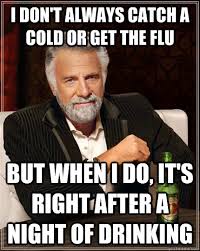Prior to beginning my health and fitness evangelist I got sick A LOT. I thought it was normal to get a few colds each winter and rely on caffeine throughout the day to combat daily fatigue and generalized flu like symptoms. FYI this is not normal…
Colds are a leading cause of doctor visits and missed days from work and school, and this season is no exception. According to a recent CBC News statistic ‘Canadians suffer from approximately 1 billion colds per year, or about two to four colds per year for the average adult.’
But why do people start getting sick as the leaves start to fall?
According to the CBC News study, when you come down with chills, fever, cough, runny nose, fatigue and all those other “flu-like” symptoms, the illness is likely caused by influenza only about, 17 percent of the time, and as little as 3 percent! The other 83 to 97 percent of the time it’s caused by other viruses or bacteria.
So remember that not every illness that appears to be the flu, actually IS the flu. In fact, most of the time it’s not.
Nevertheless, as temperatures drop, we begin to congregate indoors and spend less time in the sun. This means our vitamin D levels begin to drop, and we are more apt to spread viruses from one person to another. It isn’t that these opportunistic germs magically appear at certain times of the year—they’re always around. It’s your ability to respond to them that changes with the seasons. It is important to understand the causes of cold and flu if you want to avoid them.
The Real Cause of Colds and Flu
Many people believe that colds and flu are caused by bacteria, but this is quite frankly incorrect. Colds and flu are caused by viruses, and using antibiotics to treat a viral infection is inappropriate and completely ineffective.
Viruses are smaller than bacteria and have entirely different structures that make antibiotics useless. (Occasionally antibiotics are required if there is a secondary bacterial sinus infection or bronchitis/pneumonia, but this is the rare exception.) It is also important to recognize that, although a virus triggers your cold or flu symptoms, it is not the real cause of the illness.
So, what is the real cause of colds and flu?
My simple and short answer has always been that it’s due to an impaired immune system. That’s still true. However, research has confirmed that “catching” colds and flu may be a symptom of an underlying vitamin D deficiency! Less than optimal vitamin D levels will significantly impair your immune response and make you far more susceptible to contracting colds, influenza, and other respiratory infections.
Although there are many ways you might end up with a weakened immune system, the more common contributing factors are:
- Vitamin D deficiency, as previously mentioned
- Eating too much sugar and too many grains
- Not getting enough sleep
- Insufficient exercise
- Inadequately managing emotional stressors in your life
- Any combination of the above
THE Number One Way to Conquer a Cold or Flu: Vitamin D

Vitamin D is an amazingly effective antimicrobial agent, producing 200 to 300 different antimicrobial peptides in your body that kill bacteria, viruses and fungi.
In Canada, the late winter average vitamin D level is only about 15-18 ng/ml, which is considered a very serious deficiency state. No wonder colds and flu run rampant each year! The best source for vitamin D is direct sun exposure. But for many of us, this just isn’t practical during the winter. The next best thing to sunlight is the use of a safe indoor tanning device. If neither natural nor artificial sunlight is an option, then using oral supplements is your best bet.
Remarkably, researchers have found that 2,000 IU of vitamin D per day abolished seasonal influenza. This is somewhat surprising, as it is half the dose of what most adults need to achieve ideal levels of vitamin D
In order to prevent the flu, children and adults need 35 IU of vitamin D per pound of body weight. So, for example, a child weighing 57 pounds would need 2,000 IU a day of vitamin D.
Lifestyle Options: Choose Wisely
As you know, I can be a bit of an extremist but I strive for balance and moderation. I advocate balancing healthful choices with enjoying life, which includes celebrating from time to time. That said, if you feel yourself coming down with a cold or flu, this is NOT the time to be eating sugar, artificial sweeteners or processed foods. Sugar is particularly damaging to your immune system–which needs to be ramped up, not suppressed, in order to combat an emerging infection. You must address nutrition, sleep, exercise and stress issues the moment you first feel yourself getting a bug. This is when immune-enhancing strategies will be most effective.
When people come down with a cold or flu, it’s because some combination of factors has weakened their defenses. You might be able to get away with one or two transgressions, but a bucketful of poor choices will cause your immune system to crash. And then suddenly…you’re sick. When you’re coming down with a cold, it’s time to address ALL of the contributing factors immediately. This would be a good time to tweak your diet in favor of foods that will strengthen your immune response. Make sure you are drinking plenty of fresh, pure water. Water is essential for the optimal function of every system in your body.

Pay attention to how you are sleeping. If you aren’t getting enough sleep, or enough restorative sleep, you’ll be at increased risk for a hostile viral takeover.
And don’t underestimate the importance of regular exercise for increasing your resistance to illness. There is evidence that regular, moderate exercise can reduce your risk for respiratory illness by boosting your immune system. But at the same time, don’t overdo it. Over-exercising can actually place more stress on the body, which can suppress the immune system–and you don’t want that either. You might just go for a walk if you are coming down with something. Any rise in body temperature will be an unwelcome climate for a viral invader.
Emotional stressors can also predispose you to an infection. Finding ways to manage daily stress as well as your reactions to circumstances beyond your control will contribute to a strong and resilient immune system.
Most of the people incorporating a significant number of these wise lifestyle choices into their daily lives simply don’t get sick. And when they do, it’s mild and short-lived.
The take away points are simple: manage your stress, exercise, eat nutritionally dense foods and take a vitamin d supplement.
Three cheers for health and vitality!!!
With love from the trench kitchen,
xoxoErika♥
DISCLAIMER – I am not a medical professional nor do I claim to be a medical professional. Please seek advice from your physician prior to self diagnosing or attempting to remedy any associated aliment.
Works Cited:
- Tahan F, Yaman M. Can the Pelargonium sidoides root extract EPs® 7630 prevent asthma attacks during viral infections of the upper respiratory tract in children. Phytomedicine. (2013)
- Luna LA Jr, et al. Immune responses induced by Pelargonium sidoides extract in serum and nasal mucosa of athletes after exhaustive exercise: modulation of secretory IgA, IL-6 and IL-15. Phytomedicine. (2011)
- Matthys H, et al. Efficacy and tolerability of EPs 7630 tablets in patients with acute bronchitis: a randomised, double-blind, placebo-controlled dose-finding study with a herbal drug preparation from Pelargonium sidoides. Curr Med Res Opin. (2010)










